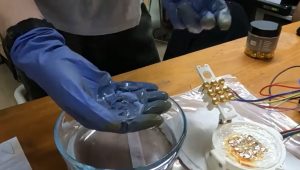Hydrogels Play Video Games: A Breakthrough in Non-Living Intelligence
The Experiment: Hydrogels Meet Pong
The study, conducted by a team at the University of Reading, involved hooking a hydrogel to a computer simulation of Pong, a game that has entertained players since its release in 1972. The researchers used a special type of hydrogel known as an electro-active polymer, which responds to electrical stimulation. This allowed the hydrogel to interact with the game environment by changing its shape based on the ball’s position.
To set up the experiment, the researchers divided the digital playfield into six sections, each controlled by electrodes. When the virtual ball moved into one of these sections, it sent an electrical signal to the hydrogel, prompting it to adjust its position. Initially, the hydrogel struggled to hit the ball consistently, but as it played, it began to improve.
How Does It Work?
The key to the hydrogel’s performance lies in its ability to “remember” previous movements. As the gel swells in response to electrical stimulation, ions within it migrate to different areas, creating a form of muscle memory. This means that the more the hydrogel plays, the better it becomes at anticipating the ball’s movement. Over time, its accuracy improved by up to 10%, leading to longer rallies in the game.
Dr. Vincent Strong, the lead author of the study, explained, “Ionic hydrogels can achieve the same kind of memory mechanics as more complex neural networks. We showed that hydrogels are not only able to play Pong; they can actually get better at it over time.” This finding is significant as it suggests that even simple materials can exhibit complex behaviors typically associated with living organisms or advanced artificial intelligence.
Implications for Artificial Intelligence
The implications of this research extend beyond just playing games. It suggests that hydrogels could serve as a simpler and more cost-effective alternative to traditional neural networks used in artificial intelligence. Current AI systems are often complex and expensive, but the ability of these hydrogels to learn and adapt could pave the way for new, innovative approaches to algorithm development.
Dr. Yoshikatsu Hayashi, a biomedical engineer involved in the study, stated, “Our research addresses whether simple artificial systems can compute closed loops similar to the feedback loops that allow our brains to control our bodies.” This insight could lead to the development of more efficient AI systems that mimic the learning processes seen in biological organisms.
Comparing Hydrogels and Biological Systems
This research builds on previous studies that demonstrated brain cells could learn to play Pong. However, the hydrogel system is distinct as it operates without biological components. While brain cells learned the game quickly, the hydrogel required more time to improve its performance. After 20 minutes of gameplay, the hydrogel achieved a hit rate of about 60%, which is above random chance, showcasing its ability to adapt and learn.
Despite these advancements, researchers caution that much work remains to be done. Dr. Kagan, who contributed to earlier studies on brain cells, noted that while the hydrogel exhibits a basic form of memory, it does not yet demonstrate true learning capabilities. “If the stimulation is modified, the system cannot adapt to maintain performance,” he explained. This contrasts with neural systems, which can retain learning regardless of changes in input.

Future Research Directions
The findings from this study are just the beginning. Researchers plan to explore the physical properties behind the hydrogel’s memory formation and test its applications in other areas. The potential for hydrogels to serve as components in soft robotics and other technologies is immense. As scientists continue to investigate these materials, we may see them play a significant role in the future of artificial intelligence development.

